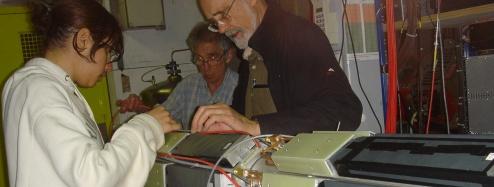
Some 30 scientists of the world-wide ALPHA Antihydrogen Collaboration will meet at TRIUMF from April 4 to April 7, 2008, in conjunction with a review of TRIUMF/Canadian involvement in the overseas project. Canadian participants come from the University of British Columbia, Simon Fraser University, University of Calgary, York University, and TRIUMF. Another dozen international participants hail from teams in Brazil, Denmark, the United Kingdom, the United States, and at CERN.
ALPHA is an international project at CERN with the goal of stable trapping of antihydrogen atoms for precision tests of symmetry between matter and antimatter. In particular, ALPHA will confront a symmetry known as CPT (a combination of Charge-conjugation, Parity and Time-reversal), an underpinning of the modern theory of subatomic physics. Given that the ordinary hydrogen atom is one of the best studied systems in all of physics, its comparison with its antimatter counter part, antihydrogen, would provide for excellent tests of matter-antimatter symmetry such as CPT.
ALPHA-Canada, constituting about 30% of the ALPHA collaboration, is a consortium of researchers from five Canadian universities as well as from TRIUMF. The Canadian group is playing leading roles in particle detection and developments towards spectroscopy.
Since the start of commissioning in 2006, ALPHA has been making rapid progress and has already published several papers. First results include the confinement of antimatter particles in a highly non-uniform magnetic field configurations required for antihydrogen trapping [Phys. Rev. Lett. 98, 023402 (2007)], and the compression of antiprotons by a rotating electric field [to appear in Phys. Rev. Lett.]. Both are important steps towards the goal of antihydrogen trapping.
At the Vancouver meeting, discussions will take place on detailed plans for the upcoming beam time from June to November 2008, as well as on strategies for future antihydrogen spectroscopy.
by Makoto Fujiwara
TRIUMF Research Scientist
